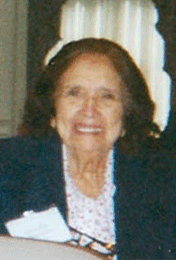
Henrieta Villaescusa (1920-2005) a Hispanic California RN and a Fellow of the American Academy of Nurses, was a unique and singular individual. During her long and varied career, Ms. Villaescusa was an instructor, mentor, role model and trailblazer who opened the door for women and Hispanics.
Born in Tucson, Arizona, she attended Mercy College of Nursing, in San Diego, which prepared her for her illustrious nurse career. She received her Bachelors degree from Immaculate Heart College and her Masters from UCLA. It was while working for the L.A. Public Health Dept. that Ms. Villaescusa became the only Hispanic Public Health Supervisor, setting in motion her career of public service in state, national and international areas.
Early on, Henrietta established a pattern of being the first Hispanic nurse to occupy key positions. She was the first Hispanic nurse to be appointed Health Administrator, in the Department of Health, Education and Welfare and the first Mexican American Chief Nurse Consultant in the Office of Maternal & Child Health, Bureau of Community Health Services, a federal government agency, where she identified the needs, tends , and priorities in nursing research and training
Her career path also included working for Congressman George Miller and she served as advisor to Congressman Edward Roybal.
In 1985, Ms. Villaescusa retired and soon after the Surgeon General Novello sought her help in developing the West Coast component of the Hispanic Health Initiative. Margaret Heckler, Secretary of Health and Human Services under President Reagan appointed her to the Task Force on Minority Health.
Ms. Villaescusa was closely associated with many organizations, including the National Coalition of Hispanic Health and Human Services Organization, the Mexican American National Women´s Association and the National Asociation of Hispanic Nurses, where she served as president from 1984 to 1988.
Ms. Villaescusa had a highly developed sense of social justice. It is the theme that is evident in her community programs and services. She developed health policies on local, state national and international level. She advocate the role that nurses could play in health policies and partnerships. Her life was truly one of dedicated service. It is a legacy that at NAHN we acknowledge and must continue if we are to honor the life and achievements of such a distinguished and dedicated Hispanic nurse.
That is why NAHN proposed an Award with her name for those in who contributed to essential community services.